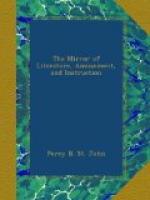on the south side of the square. Steele lived
in Bury-street, St. James’; he furnishes an
illustrious precedent for the loungers in St. James’-street,
where scandal-mongers of those times delighted to
detect Isaac Bickerstaff in the person of captain Steele,
idling before the Coffee-house, and jerking his leg
and stick alternately against the pavement. We
have mentioned the birth of Ben Jonson, near Charing-cross.
Spenser died at an inn, where he put up on his arrival
from Ireland, in King-street, Westminster—the
same which runs at the back of Parliament-street to
the Abbey. Sir Thomas More lived at Chelsea.
Addison lived and died in Holland House, Kensington,
now the residence of the accomplished nobleman who
takes his title from it. In Brook-street, Grosvenor-square,
lived Handel; and in Bentinck-street, Manchester-square,
Gibbon. We have omitted to mention that De Foe
kept a hosier’s shop in Cornhill; and that, on
the site of the present Southampton-buildings, Chancery-lane,
stood the mansion of the Wriothesleys, Earls of Southampton,
one of whom was the celebrated friend of Shakspeare.
But what have we not omitted also? No less an
illustrious head than the Boar’s, in Eastcheap—the
Boar’s Head Tavern, the scene of Falstaff’s
revels. We believe the place is still marked out
by a similar sign. But who knows not Eastcheap
and the Boar’s Head? Have we not all been
there time out of mind? And is it not a more real,
as well as notorious thing to us, than the London
Tavern, or the Crown and Anchor, or the Hummums, or
White’s, or What’s-his-name’s, or
any other of your contemporary and fleeting taps?
[2] The Temple must have had many eminent
inmates. Among them, it is believed, was
Chaucer, who is also said, upon the strength of
an old record, to have been fined two shillings for
beating a Franciscan Friar in Fleet-street.
“Before we rest our wings, however, we must
take another dart over the city, as far as Stratford
at Bow, where, with all due tenderness for boarding-school
French, a joke of Chaucer has existed as a piece of
local humour for nearly four hundred and fifty years.
Speaking of the Prioress, who makes such a delicate
figure among his Canterbury Pilgrims, he tells us,
among her other accomplishments, that—
‘French she spake full faire and
featously;’
adding with great gravity,
’After the school of Stratford atte
Bowe;
For French of Paris was to her unknowe.’
* * * *
*
CURIOUS FACTS RELATING TO SLEEP.
(For the Mirror.)
“Next to those nourishments that sustain the
body (says Dr. Venner) moderate and seasonable sleep
is most profitable and necessary. It helps digestion,
recreates the mind, repairs the spirits, and comforts
and refreshes the whole body.” It is also
observed by Dr. Hufeland, that “sleep is one
of the wisest regulations of nature, to check and moderate
at fixed periods, the incessant and impetuous stream
of vital consumption. It forms as it were, stations
for our physical and moral existence, and we thereby
obtain the happiness of being daily reborn, and of
passing every morning through a state of annihilation,
into a new and refreshed life.”




